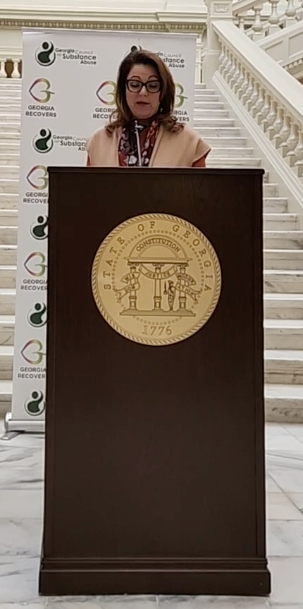
ATLANTA – Mental health advocates urged Georgians Tuesday to “vote for mental health” at a press conference at the state Capitol.
“Mental health is not a Democratic issue or a Republican issue. It is a Georgia issue,” said Kim Jones, executive director of the National Alliance on Mental Illness-Georgia. “Make sure your voice is heard and vote. … Every elected official … has influence on issues impacting people who are impacted by a mental health condition.”
Kristen Petillo, area director for the Georgia chapter of the American Foundation for Suicide Prevention, praised the steps Georgia has already taken to address its mental health problems, such as passing a major mental health reform law during this year’s legislative session. The new law requires insurers to treat mental health conditions on par with how they treat physical conditions, along with many other new measures.
But still more is needed, Petillo said, especially given widespread mental health problems among Georgia youth.
Petillo cited a recent study that found more than half of Georgia’s middle- and high-schoolers reported feeling depressed, sad or withdrawn at least once in the prior month, and that one in eight have seriously considered suicide within the past year.
“Although many Georgians are remarkably resilient, those who are exposed to unfavorable circumstances are at higher risk of experiencing behavioral health conditions,” Petillo said.
Petillo pointed to racial and ethnic minorities, LGBTQ+ community members, low-income groups and people living in rural areas as groups who face multiple socioeconomic and health challenges that can lead to greater mental health burdens.
For example, people living in rural Georgia are about twice as likely to die by suicide as people living in suburban and urban areas because of the wider availability of lethal means, greater social isolation and less access to care in many rural areas, Petillo said.
Petillo outlined several key priorities for going forward, such as working to increase access to mental health providers, holding insurers accountable for treating mental health conditions, and focusing on health equity and disparities.
Darlene Lynch, head of external relations for the Center for Victims of Torture in Atlanta, said that more culturally and linguistically accessible care is needed to meet the needs of the one-in-10 foreign-born Georgians.
“Because of the cultural and linguistic barriers, the lack of access in our state … compared to the other top 10 most diverse states in the nation, we lag behind” in providing care to such immigrants, Lynch said. She suggested creating a special division in the state government to focus on providing linguistically and culturally sensitive care.
A recent report by the national organization Mental Health America found mixed results for Georgia.
The organization’s overall ranking combining 15 factors related to mental health placed Georgia 24th in the country.
But when the report zoomed in on specific measures, Georgia fared worse. For example, the Peach State was ranked first for prevalence of mental illness and for adults with serious thoughts of suicide. Georgia was ranked second for rates of youth with substance disorders in the past year and placed 49th in the access-to- care rankings.
The state’s Behavioral Health Reform and Innovation Commission has been meeting this fall to develop further mental health reform recommendations for the legislature to consider next year.
Jones said that Georgians can visit Vote4MentalHealth.org to learn more about mental health issues and voting in the upcoming election. Georgians seeking help with mental health or substance issues can also dial 9-8-8 to speak with a trained counselor.
This story is available through a news partnership with Capitol Beat News Service, a project of the Georgia Press Educational Foundation.
